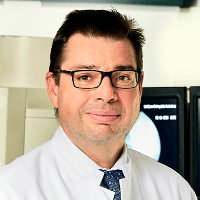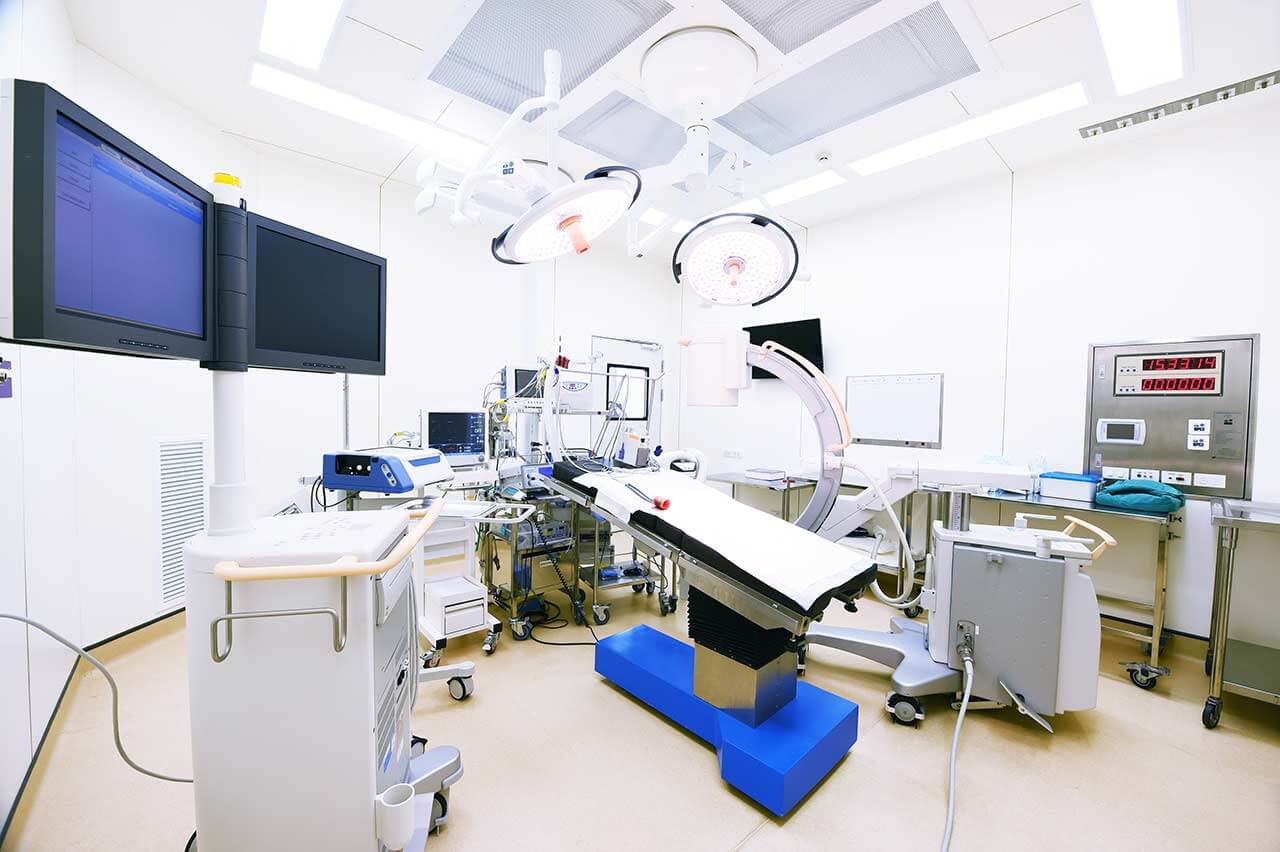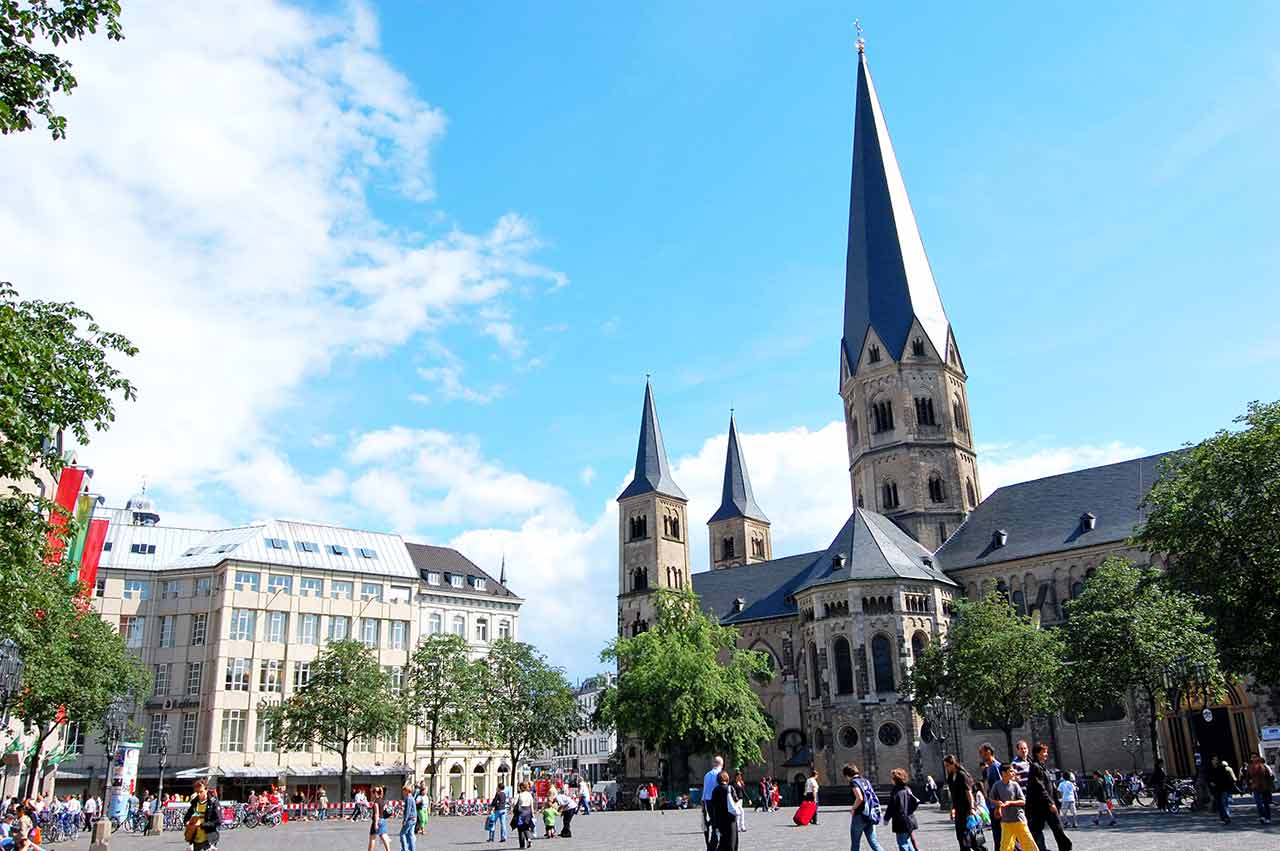
The program includes:
- Initial presentation in the clinic
- clinical history taking
- physical examination
- review of medical records
- laboratory tests:
- complete blood count
- general urine analysis
- biochemical analysis of blood
- TSH-basal
- indicators of inflammation
- indicators blood coagulation
- x-ray/ MRI examination
- preoperative care
- knee arthroscopy
- symptomatic treatment
- control examinations
- cost of essential medicines and materials
- nursing services
- full hospital accommodation
- explanation of future recommendations
Required documents
- Medical records
- X-ray examination, MRI/CT scan (if available)
Service
You may also book:
 BookingHealth Price from:
BookingHealth Price from:
About the department
According to the Focus magazine, the Department of Orthopedics and Traumatology at the University Hospital Bonn ranks among the top German departments specializing in joint replacement surgery!
The department specializes in the diagnostics and treatment of all diseases and injuries of the musculoskeletal system. The therapeutic options include both conservative and surgical treatments. The department has 5 modern operating rooms, which meet stringent hygienic standards and a high technological level (for example, 2D and 3D X-rays, navigation systems, surgical microscopes, etc.). Also, it is possible to perform operations on an outpatient basis. The Chief Physician of the department is Prof. Dr. med. Dieter Christian Wirtz.
The department operates a round the clock interdisciplinary emergency unit, which has special competences in the treatment of patients with all types of acute diseases and injuries of the musculoskeletal system.
The department also pays key attention to early rehabilitation, which is carried out on the basis of the personalized treatment plan immediately from the first day after surgery, with the assistance of the experienced physiotherapists. The rehabilitation team is highly qualified and offers a wide range of procedures, including classical physiotherapy, instrumental physiotherapy, manual therapy, water procedures, electrotherapy, massage, mud therapy and other methods.
The service range of the department includes:
- Joint surgery
- Shoulder, elbow, hip, knee and ankle replacement surgery, including the revision interventions (certified Venter for Endoprosthetics of maximum care)
- Replacement of aseptic and septic poorly fixed knee and hip prostheses
- Arthroscopic shoulder and elbow surgery (shoulder stabilization, subacromial decompression, rotator cuff reconstruction)
- Arthroscopic knee and ankle surgery (meniscus surgery, cruciate ligament replacement surgery, cartilage surgery)
- Joint-conserving transposition osteotomy of the pelvis, hip, knee, ankle joints
- Transplantation of autologous cartilaginous cells to the knee and ankle
- Corrective surgery in axial deformities of the lower limbs
- Foot surgery with the correction of all congenital and acquired deformities
- Orthopedic rheumatology
- All joint-conserving surgical methods (for example, removal of the joint synovial membrane)
- Radiosynoviorthesis
- Resection arthroplasty (partial joint dissolution)
- Endoprosthetics
- Treatment of diseases and injuries of the musculoskeletal system, accompanied by hemophilia
- Hand surgery
- All injuries of the hand, wrist and forearm (individual injuries or polytrauma)
- Thermal burns, chemical burns, frostbite, necrosis
- Nerve compression syndromes, such as carpal tunnel syndrome
- Tendon disorders (for example trigger fingers)
- Ganglion cyst on the wrist, finger joints and tendon sheaths
- Foreign body removal, for example, glass fragments
- Dupuytren's contracture
- Rhizarthrosis
- Suturing/reconstruction of injuries of the wrist and carpal articulation
- Wrist arthroscopy
- Neoplasms on the skin of the hand (for example, warts)
- Plastic reconstructive surgery in injuries of the musculoskeletal system
- Necrotomy
- Vacuum wound therapy
- Split flap transplantation
- Plastic surgery with local and free flaps
- Sports orthopedics and traumatology
- Surgical treatment of benign and malignant tumors of bone and soft tissues of the musculoskeletal system (in interdisciplinary collaboration within the Center for Integrated Oncology Bonn)
- Traumatology
- Life-threatening injuries (polytrauma/multiple injuries)
- High-risk patients (for example, with surgical interventions in medical history, heart diseases, diabetes mellitus, infections)
- Fractures and injuries of all joints of the musculoskeletal system
- Complicated fractures (for example, open fractures or fractures with damage to the muscles, blood vessels, nerves and skin)
- Reconstructive surgery of the articular, bone and soft tissues
- Treatment of infectious complications
- Correction of defects after accidents
- Hand injuries
- Foot injuries
- Diagnostics and treatment of spinal diseases
- Conservative therapy
- Differentiated infiltration therapy of facet joints, nerve roots, epidural space, sclerotherapy of small vertebral joints (X-ray-guided)
- Outpatient and inpatient physiotherapy
- Conservative treatment of spinal inflammation (spondylodiscitis and spondylitis)
- Surgical treatment (minimally invasive and endoscopic spinal surgery)
- Minimally invasive, endoscopic and microscopic surgery of the intervertebral discs (for example, in spinal disc herniation)
- Percutaneous laser decompression of the intervertebral disc during its symptomatic protrusions
- Vertebroplasty and kyphoplasty
- Intervertebral disc replacement in the cervical and lumbar spine (for example, in osteochondrosis, accompanied by spinal disc herniation)
- Selective decompression surgery in spinal stenosis
- Dynamic stabilization of the individual spinal segments
- Mono- and multisegmental stability operations (spinal fusion) in instability caused by degenerative, traumatic, inflammatory and neoplastic changes
- Spondylolisthesis correction
- Ventral (transthoracic) and dorsal spinal fusion for the treatment of spinal deformities, such as scoliosis and kyphosis
- Cancer surgery of all spinal sections (in interdisciplinary collaboration)
- Revision spinal surgery
- Surgical treatment of the inflammatory spinal diseases (spondylodiscitis and spondylitis)
- Conservative therapy
- Rehabilitation measures
- Other diseases, treatment methods
Curriculum vitae
- 1986 - 1992 Study of Medicine at the Medical Faculty of the RWTH Aachen.
- 03.12.1992 Admission to medical practice.
- 11.10.1993 Doctoral thesis defense, Medical Faculty, RWTH Aachen
- 01.1993 - 06.1994 Intern in the Department of Traumatology and Reconstructive Surgery, Surgery Center, Katherinenhospital Stuttgart, Prof. Dr. med. U. Holz.
- 07.1994 - 12.1994 Assistant Physician, Department of Surgery, Wiesbaden Hospital (Prof. Dr. med. H. Peters).
- 12.1994 - 06.1999 Physician in the Department of Orthopedics at the University Hospital Aachen (Prof. Dr. med. F. U. Niethard).
- 07.1999 - 08.2003 Senior Physician in the Department of Orthopedics at the University Hospital Aachen.
- 08.21.2001 Habilitation and Venia Legendi in Orthopedics, Medical Faculty of RWTH Aachen.
- 09.2003 - 10.2006 Leading Senior Physician, Department of Orthopedics, University Hospital Aachen.
- Since 08.2005 Deputy Head of the Department.
- 21.07.2006 Extraordinary Professor, RWTH Aachen.
- 30.10.2006 W3 Professor, Department of Orthopedics and Traumatology, University of Bonn.
- 30.10.2006 Head of the Department of Orthopedics and Traumatology at the University Hospital Bonn.
- 22.09.2008 Managing Director of the Surgery Center at the University Hospital Bonn.
Photo of the doctor: (c) Universitätsklinikum Bonn
About hospital
According to the authoritative Focus magazine, the University Hospital Bonn ranks among the top ten medical facilities in Germany!
The hospital was opened on January 1, 2001, although in fact it inherits the medical facility, which operated at the Faculty of Medicine of the University of Bonn. The hospital in Germany combines all the highest standards of modern university medicine of the international level. A highly competent team of experienced physicians, which consists of more than 8,000 employees from various fields, takes care of the patients’ health.
The hospital has 32 specialized departments and 23 institutes, which implement the highest standards of treatment in Germany. On their basis, in addition to the successful clinical activities, the productive research and training of young specialists are carried out. Also, the hospital has 10 intensive care units and more than 30 cutting-edge operating rooms. They are equipped with the advanced surgical, navigation and monitoring systems, which provide sparing and the most effective surgical treatment. The total number of places for hospitalization is 1,250 beds.
The hospital presents all fields of medicine, while many of them are awarded by prestigious German and international certificates. For example, in 2007, the Comprehensive Cancer Center of the hospital became one of the four winners at the nationwide competition among Cancer Centers of Excellence. The research focuses primarily on the clinical genetics and genetic epidemiology, neurology, immunology and infectiology, hepatology and gastroenterology, and diseases of the cardiovascular system. The research findings contribute to the development of new therapeutic methods and overall improvement of treatment in Germany.
The main value for all employees of the hospital in Germany is human health, his individual needs and wishes, therefore, despite the high-tech infrastructure, the focus remains on the human attitude and respect for each patient.
Photo: (с) depositphotos
Accommodation in hospital
Patients rooms
The patients of the University Hospital Bonn live in cozy single, double and triple rooms, designed in bright colors. The standard room furnishing includes a comfortable bed with a remote control, a bedside table, a wardrobe, a table and chairs, as well as a TV and a telephone. Each patient room is equipped with an ensuite bathroom with toilet and shower. The hospital also provides enhanced-comfort rooms.
Meals and Menus
The patients of the hospital are offered tasty and balanced three meals a day: breakfast, lunch and dinner. Every day each meal features three different menus, including a vegetarian one. If you for some reason do not eat all the food, you will be offered an individual menu. Please inform the medical staff about your dietary preferences prior to the treatment.
Further details
Standard rooms include:
Religion
Christian priests are available for the patients at any time. Representatives of other religions may be requested at any time.
Accompanying person
Your companion may stay with you in your room or at a hotel of your choice during the fixed program.
Hotel
You may stay at the hotel during the outpatient program. Our employees will support you for selecting the best option.
The hospital offers a full range of laboratory tests (general, hormonal, tests for infections, antibodies, tumor markers, etc.), genetic tests, various modifications of ultrasound scans, CT scans, MRI and PET / CT, angiography, myelography, biopsy and other examinations. Treatment with medications, endoscopic and robotic operations, stereotaxic interventions is carried out here, modern types of radiation therapy are also used. The hospital offers patients all the necessary therapeutic techniques.
- Surgical treatment of the brain tumors, tumors of spinal cord and spine
- Replacement of all joints, resection arthroplasty
- Deep brain stimulation and vagus nerve stimulation in patients with epilepsy
- Multimodal complex treatment of Parkinson disease
- Thoracic endovascular aortic repair (TEVAR)
These are benign and malignant breast pathologies, malignant tumors of various localizations, neuromuscular diseases, stroke, retinal pathologies and various visual impairments, infertility, autoimmune diseases, epilepsy, coronary artery disease and myocardial infarction, leukemia and other pathologies.
- Ophthalmology
- Epileptology
- Reproductive medicine
- Hematology and oncology
- Neurosurgery
Over 8,000 highly qualified doctors and other employees work at the hospital.





